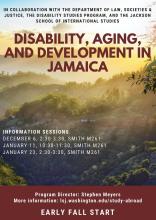This Early Fall Start program focuses on the lived experience of persons with disabilities, older persons, and others in Jamaica by interviewing, volunteering, and participating in the activities of grassroots associations, non-profit organizations, and government agencies. On a daily basis, we will meet with human rights advocates, educators, policymakers, and others to try to understand what it means to live with a disability or as an older person within the context of a developing country and the ways in which disabled persons and older persons themselves are agents of social change and contributors towards Jamaica's development. As a group, we will spend one week in Jamaica's capital Kingston, one week on its northern coast in Discovery Bay, and one week in the mountains outside Mandeville living in the Jamaica Deaf Village, where the main language is sign language.
Together, we will:
- See what local grassroots associations are doing to promote the human rights and development of persons with disabilities and older persons in Jamaica.
- Discuss Jamaica’s disability law and policy with Senator Floyd Morris, Jamaica’s first blind member of Parliament.
- Volunteer with adolescents with psychosocial disabilities at the Kingston YMCA and children with intellectual disabilities at the Early Intervention Center
- Compare accessibility, inclusion, and rehabilitation in urban and rural communities.
- Understand what the National Council of Senior Citizens and Jamaican Council for Disabled Persons do to protect some of Jamaica’s most marginalized population.
- Roast coffee with Deaf Can, a group of young entrepreneurs with hearing impairments.
- Live for a week at the Jamaica Deaf Village, where the primary language is sign language.
- Visit the farms of disabled farmers and learn how they work together to make ends meet.
- Assess if the island’s tourism industry benefits Jamaica’s seniors and disabled persons.
- Find out what it means to be part of the Windrush Generation, Jamaicans who immigrated to the UK to rebuild the country after WWII and are now being “returned home” after decades living abroad.
- Tour Treasure Beach, a coastal village that is preparing for the next hurricane by developing plans to make sure that older persons and persons with disabilities can evacuate to accessible shelters.
- Learn what UN Agencies, USAID, and others are doing to include older persons and persons with disabilities in their projects and programs.
- Talk to retired veterans at the Caribbean’s only Old Soldiers Home.
- Cook healthy, traditional foods with seniors at Jamaica’s only rural diabetes clinic.
- Learn what the UN Convention on the Rights of Persons with Disabilities and the planned UN Convention on the Rights of Older Persons means on the ground.
Did you know?
- Persons with disabilities in developing countries account for 1 in 5 of all people living on less than $1 a day.
- Older persons are also disproportionately poor, with one third in developing countries living in extreme poverty.
- Yet, just 1 % of all foreign aid reaches disabled persons and older persons.
Jamaica was the first country to:
- Sign the UN Convention on the Rights of Persons with Disabilities (2007)
- Develop a National Policy for Senior Citizens (1997) in the Caribbean.
Demographics and Development:
Jamaica is one of the fastest aging countries in the world
- Today 12% of the Jamaican population are over sixty, but by 2050 a full 25% of the population will be, the same level Japan is experiencing today.
- This is because fertility rates have been cut in half in just a generation and a half while life expectancy has increased by more than a decade.
The number of Jamaicans with disabilities is on the rise.
- Right now, an estimated 15% of the population are persons with disabilities, but that number is likely to increase.
- This is because developing countries like Jamaica experience the “double burden of disease,” where traditional chronic illnesses persist at the same time new ones that are associated with development, such as diabetes, emerge.
Local Hosts:
- Intergenerational Caribbean, a grassroots older persons advocacy association
- Combined Disability Association, a national advocacy network of disabled persons
Accommodations:
- University of West Indies Main Campus, Kingston (10 days)
- Discovery Bay Marine Research Lab, Runaway Bay (1 week)
- Jamaica Deaf Village, Mandeville (1 week)
Instructors:
- Stephen Meyers, Assistant Professor in LSJ, JSIS & Disability Studies
- Megan McCloskey, PhD Candidate in Law
When: Early Fall Start (August/September)
Cost: $4,650 [includes lodging, field trips and some meals]
Information Sessions:
Typically December and January
